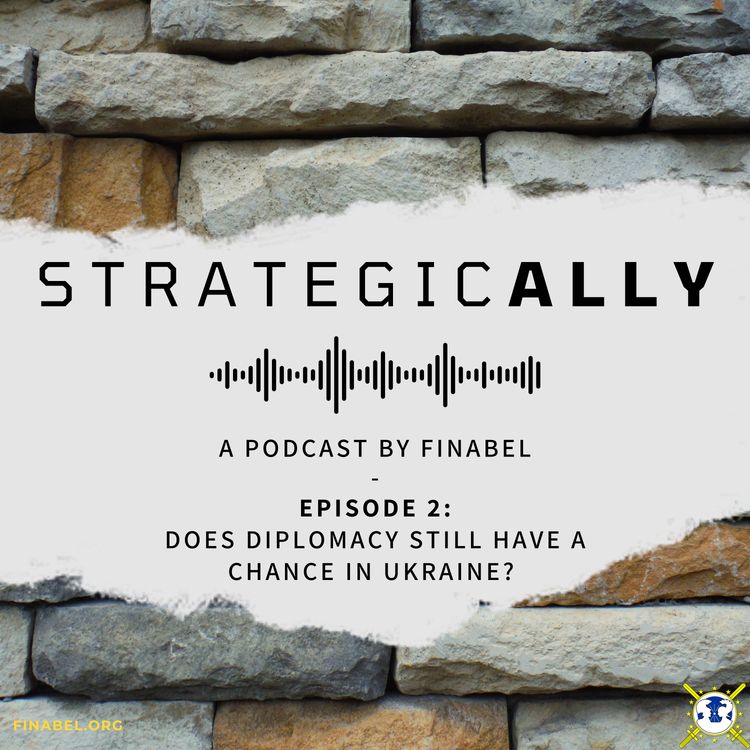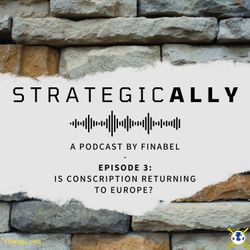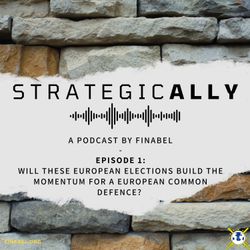Share

StrategicALLY
Does Diplomacy Still Have a Chance in Ukraine?
Between the 15th and the 16th of June 2024, delegations from nearly 100 countries gathered in Bürgenstock Resort in Switzerland to discuss a path to peace in Ukraine. While Russia and its key ally China were not there, most participants reaffirmed their support for Ukraine’s territorial integrity and the core principles of international law in the final communique.
In the second episode of StrategicALLY, Gaia Durante Mangoni and Patricia Bernardo are joined by Andreas Umland, Senior Analyst at the Stockholm Centre for Eastern European Studies and a research fellow at the Swedish Institute for International Studies, to talk about the outcomes of the Ukraine Peace Summit in Switzerland and its significance for future diplomatic efforts. They assess how successful this conference was for Kyiv and Ukrainian President Zelenskyy’s efforts to rally the support of as many countries as possible for its peace formula. They also analyse the current situation on the battlefield and the implications of Ukraine's Western allies easing restrictions on the use of certain weapons. Finally, they examine the nuclear risks of this war and Russia’s peace plan.
Edited and produced by Gaia Durante Mangoni.
More episodes
View all episodes

9. Innovation Meets Operations: AI, Unmanned Systems, and European Defence Readiness
24:01||Season 1, Ep. 9In this episode of StrategicALLY, hosts Livia Perrulli and Simon Perrin de Brichambaut are joined by Yves Augustus, former Belgian Army officer and Director of Business Development at STARK. With a background spanning engineering, defence, and business development, Mr. Augustus brings a unique perspective on how Europe can bridge capability gaps through innovation.We explore how the private sector can better respond to the operational needs of armed forces, the potential of AI-powered unmanned systems, and what capabilities are still lacking across European defence. Mr. Augustus also shares his views on transatlantic innovation gaps, lessons from U.S. initiatives like the Replicator program, and how EU defence investments could reshape industrial readiness.Tune in as we discuss how responsible innovation and military insight can drive strategic resilience and strengthen Europe’s position in a competitive global landscape.Podcast edited by Livia Perrulli.For more information about STARK and its work, visit their website and follow Yves Augustus on LinkedIn.Learn more about Finabel by visiting the official website and following us on our social media platforms.
8. Wargames and Beyond: How NATO Prepares for Modern Conflict
19:07||Season 1, Ep. 8In this episode of StrategicALLY, hosts Livia Perrulli and Nicola Bonsegna are joined by Major Stephen Nelson, Simulation Officer at the U.S. Army Futures Command and former Program Director for NATO’s Next Generation Modelling and Simulation. Together, we explored the strategic use of modelling, simulation, and wargaming in NATO.We discuss how these tools support defence foresight, operational readiness, and multinational cooperation. Major Nelson shares insights on NATO’s efforts to build a common synthetic environment, enhance interoperability among Allies, and embrace new technologies such as AI, digital twins, and cloud-based platforms.Tune in as we unpack how simulations and wargames help prepare commanders for modern conflict and inform real-world decision-making.Podcast edited by Livia Perrulli.For more information abour wargaming and M&S, follow Major Nelson on his LinkedIn.Learn more about Finabel by visiting the official website and following us on our social media platforms.
7. The Role of Space in European Security and Defence
24:40||Season 1, Ep. 7In this episode of StrategicALLY, hosts Doğa Sultan Önaçan and Manuel Dias are joined by Colonel Marcin Mazur from the Polish Space Agency (POLSA) to explore the evolving role of space in European security. We discuss space warfare, dual-use technologies, and the EU's path to strategic autonomy in space. Colonel Mazur shares valuable insights on the challenges Europe faces in protecting space assets and advancing space capabilities. Topics covered include the weaponization of orbital debris, the development of military space vehicle technology, and the EU's efforts in achieving autonomous space access. Tune in as we discuss how Europe is positioning itself to secure the future of its space domain.Podcast edited by Livia Perrulli.For more information on the Polish Space Agency, visit POLSA's official website.Learn more about Finabel by visiting Finabel's official website and following us on our social channels.
6. European Military Support for Ukraine
42:21||Season 1, Ep. 6In this episode of StrategicALLY, hosts Zsigmond Tar and Katharina Brzuska discuss with Gustav Gressel, an expert in Eastern Europe, Russia and in military affairs, the European military support for Ukraine. Drawing from valuable experience at the Austrian Ministry of Defence and the European Council on Foreign Relations, he offers details on the current situation in Ukraine and explains how the war has evolved through nearly three years. As we address areas such as the coordination of arms deliveries, the role of advanced weapons and drone warfare, this episode aims to provide insight into the challenges Ukraine faces in maintaining its defence and sovereignty. The sounds for this podcast were edited by Irina Antonescu. References: Gressel, G. (2024, January 18). “Beyond the counter-offensive: Attrition, stalemate, and the future of war in Ukraine”, European Council on Foreign Relations (ECFR). https://ecfr.eu/publication/beyond-the-counter-offensive-attrition-stalemate-and-the-future-of-the-war-in-ukraine/#how-europeans-can-assist-ukraine Gressel, G. (2024, November 15). Der Untergang: As Trump returns, Putin will reap the rewards of Europe’s inaction on Ukraine. ECFR; European Council on Foreign Relations (ECFR). https://ecfr.eu/article/der-untergang-as-trump-returns-putin-will-reap-the-rewards-of-europes-inaction-on-ukraine/
5. AI and Geoeconomics: Understanding Europe’s Security Landscape
41:26||Season 1, Ep. 5In this episode of StrategicALLY, hosts Belén Padrón Salinas and Zsigmond Tar sit down with Heiko Borchert, owner and manager of Borchert Consulting & Research AG, a strategic affairs consulting company that focuses a broad range of security issues. We will discuss the dynamics of geoeconomics and artificial intelligence for the defence industries in Europe, touching aspects such as the security of supply chains, interoperability and the modernisation of European militaries. Mr Borchert shares his expertise on the application of artificial intelligence and the geoeconomic aspects for armed forces and defence industries in Europe. As co-author of the book ‘The Very Long Game’ where 25 different countries are analysed as case studies for implementing AI in the militaries, Mr Borchert provides us valuable information on the modernisation of militaries across Europe. The podcast recording and sounds have been edited by Irina Antonescu. ReferencesBorchert Consulting and Research AG website: https://www.borchert.ch/Borchert, H. (2020). The European Way. How to advance Europe’s strategic autonomy by pairing liquidity with data to make supply chains more transparent, resilient and sustainable, EY. Borchert, H., Schütz, T., & Verbovszky, J. (2021). Beware the Hype: What Military Conflicts in Ukraine, Syria, Libya, and Nagorno-Karabakh (Don’t) Tell Us About the Future of War.Borchert, H., Schütz, T., & Verbovszky, J. The Very Long Game.Borchert, H., Schütz, T., & Verbovszky, J. (2021). War as a service: stop overhyping technology. RSIS Commentaries, 123-21.Borchert, H., Schütz, T., & Verbovszky, J. (2022). Adaptive Portfolio: Catalysing NATO’s Performance Through Innovation. GLOBSEC.
4. European Deterrence and the Changing U.S. Strategy
31:31||Season 1, Ep. 4In this episode of StrategicALLY, hosts Bori Benedek and Zsigmond Tar sit down with Paul van Hooft, a defence and deterrence expert at RAND Europe, to explore the evolving dynamics of European security. The discussion covers critical topics such as NATO enlargement, European deterrence, and the shifting focus of American foreign policy from Europe to the Indo-Pacific. Mr. van Hooft provides context on the potential implications of a Trump administration on transatlantic relations, the war in Ukraine, and the strategic cohesion of European militaries. Drawing on his extensive research and publications, he discusses Europe’s reliance on the U.S. in key military sectors, the necessity for European fallback options, and the prospects for enhanced EU-NATO collaboration. Packed with expert insights, this episode offers a comprehensive analysis of the future of European defence in an increasingly multipolar world.ReferencesDeter, Compete, and Engage: Europe’s Responsibility within the Arms Control Regime after Ukraine, with or without the United States: https://www.researchgate.net/publication/379021985_Deter_Compete_and_Engage_Europe’s_Responsibility_within_the_Arms_Control_Regime_after_Ukraine_with_or_without_the_United_StatesW/ Ivan Oehlrich and Stephen Biddle Anti-satellite warfare, proliferated satellites, and the future of space-based military surveillance: https://www.tandfonline.com/doi/full/10.1080/01402390.2024.2379398Every Which Way But Loose: The United States, NATO Enlargement, European Strategic Autonomy and Fragmentation https://link.springer.com/content/pdf/10.1007/978-3-031-23364-7_13.pdf?pdf=inline+linkW/Davis Ellison – Twilight of Atlanticism? America’s shifting approach to Europe: https://hcss.nl/wp-content/uploads/2024/11/Twilight-of-Atlanticism-HCSS-2024.pdfW/ Tim Sweijs, Philip Geurts – Strengthening deterrence against nuclear, conventional, and hybrid threats: Strengths, Weaknesses, and Insights for US Allies in Europe and Asia: https://hcss.nl/report/strengthening-deterrence-nuclear-conventional-hybrid-threats/Transatlantic relations after four years of Trumpism: a postmortem: https://www.researchgate.net/publication/351271137_Transatlantic_relations_after_four_years_of_Trumpism_a_postmortem
3. Is Conscription Returning to Europe?
28:50||Season 1, Ep. 3Since the end of the Cold War, most European countries have suspended compulsory military service, reducing their militaries to a relatively small force of volunteers. The consequences of the cuts to military budgets have become more apparent following Russia’s full-scale invasion of Ukraine in 2022. While only 9 out of the 27 Member States of the EU have compulsory military service today, developing highly professional armed forces capable of conducting multinational complex operations has become a huge challenge.In the third episode of StrategicALLY, Gaia Durante Mangoni is joined by Sophia Besch, a Senior Fellow in the Europe Program at the Carnegie Endowment for International Peace. They discuss whether we are witnessing a comeback of mandatory military service in Europe and the main conscription challenges for European countries. They explore how states are reshaping their military service models to make them more attractive and fit for this new era of collective defence. They also look at concrete examples of how conscription is particularly successful today, including Finland and Sweden.For more about the topics discussed in this episode, check out Sophia Besch's latest publication on Europe’s Conscription Challenge: Lessons From Nordic and Baltic States.The news clips in this episode are taken from: video “Compulsory military service back on the table in Europe as war rages in Ukraine” published on the Youtube channel of FRANCE 24 English on 28 May 2024; video “Denmark announces compulsory military service for women too” published on DW News’ Youtube channel on 15 March 2024.Edited and produced by Gaia Durante Mangoni.
1. Will these European elections build the momentum for a European common defence?
24:43||Season 1, Ep. 1As we enter the 2024 European elections voting weekend, defence and security is one of the main campaign issues for voters.In the first episode of Finabel’s brand-new podcast, the hosts Gaia Durante Mangoni and Patricia Bernardo are joined by Thomas Tindemans, chairman of the strategic communications consultancy Hill & Knowlton, to discuss why European common defence and security should be on every European citizen’s mind when heading to the polls. Thomas, Gaia and Patricia explain why a vote that recognises the potential of a more coordinated military approach is important. They also stress why having representatives in the European Parliament who promote interoperability can overall improve the EU’s effectiveness in navigating an increasingly volatile security environment.Edited and produced by Gaia Durante Mangoni.